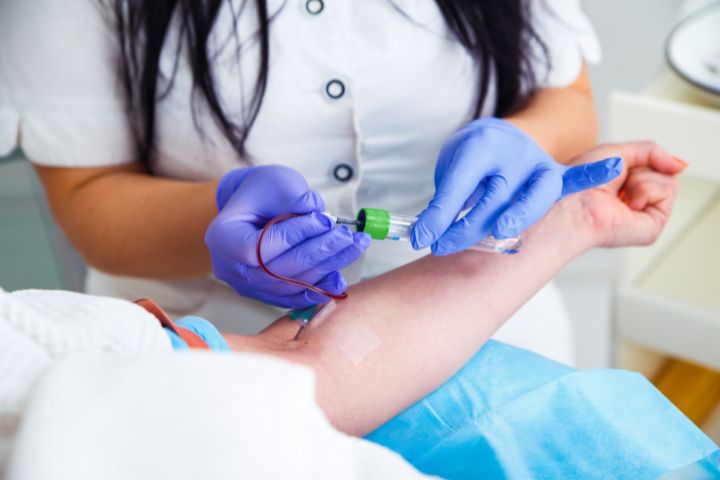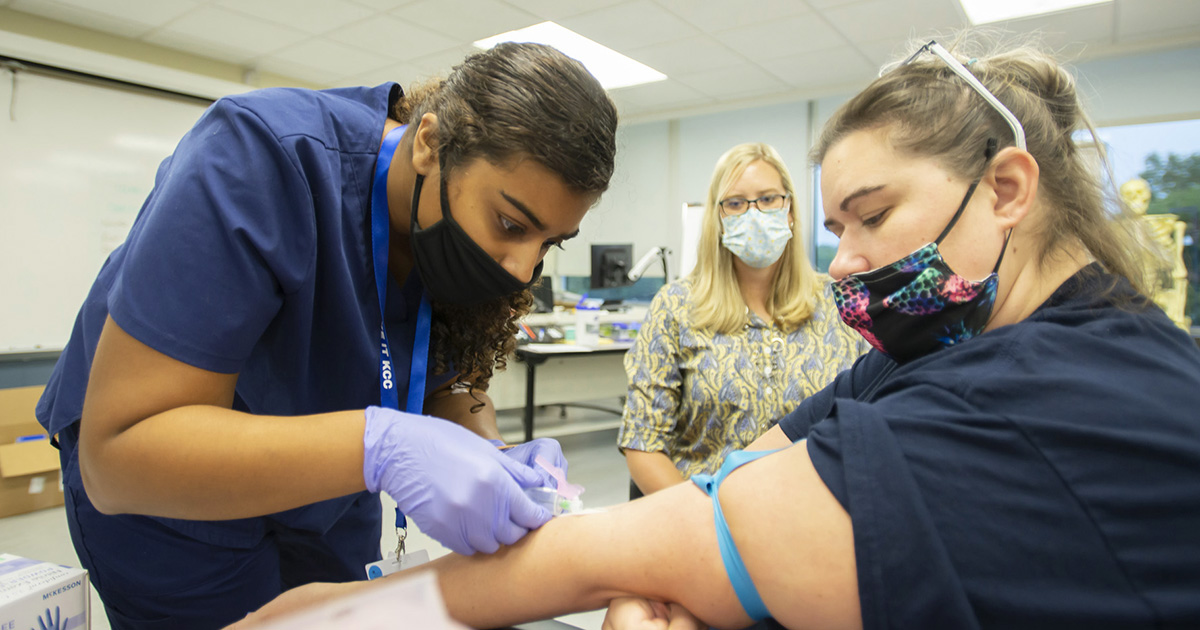Phlebotomy school vs Other Healthcare Paths: A Comparative Guide
Phlebotomy school vs Other Healthcare Paths: A Comparative Guide
Blog Article
What You Need to Know Prior To Starting a Phlebotomy Training Program for Future Success
Prior to you start a phlebotomy training course, it's necessary to understand what the function requires and the skills you'll require to do well. Researching certified programs can establish the structure for your education, yet don't neglect the value of hands-on experience and social abilities. You'll additionally wish to consider accreditation demands certain to your state. What should you focus on in your prep work? Allow's discover the essential factors that can shape your future in this field. Phlebotomy Training Course.
Recognizing the Role of a Phlebotomist
Phlebotomists play a vital function in the health care system, as they're accountable for injuring samples for tests, transfusions, or donations. You'll find yourself operating in numerous setups, like medical facilities, centers, and research laboratories, where precision and professionalism and trust are crucial. Every day, you'll communicate with clients, discussing treatments to alleviate their stress and anxiety, which assists construct depend on and relationship.
Your jobs consist of preparing devices, keeping a clean and sterile setting, and ensuring precise labeling and paperwork of samples. You'll additionally require to remain updated on safety and security methods and regulations, as patient safety and security is non-negotiable. Phlebotomists usually collaborate with various other health care specialists, adding to exact diagnoses and effective treatment plans.
In this function, you should be detail-oriented and reliable, in addition to possess a solid sense of compassion. Being a phlebotomist isn't almost drawing blood; it's about making a favorable influence on people' lives.
Trick Skills Needed for Success in Phlebotomy
To flourish in phlebotomy, you'll require a blend of technological and social skills that establish you apart from others in the medical care field (Phlebotomy Training Course). Mastering venipuncture methods is important; you must be comfortable with needles and discover to attract blood successfully. Interest to detail is very important, as precise labeling and documents can considerably affect individual treatment
Social skills additionally play an important function. You'll engage with people routinely, so being understanding and friendly aids ease their anxiety. Good interaction abilities are very important for clarifying treatments and making certain patients feel informed and safe.
Furthermore, time administration and business abilities will certainly keep you effective, particularly in active medical care setups. Remaining upgraded on safety and security protocols and regulations is non-negotiable to assure both your safety and security and that of your clients. By honing these skills, you'll place on your own for success in the dynamic area of phlebotomy.
Choosing the Right Phlebotomy Educating Program
Just how can you assure you're selecting the best phlebotomy training program for your demands? Start by investigating certified programs in your location.

A program that helps you protect a work post-training can offer you a substantial benefit in your phlebotomy occupation. With these variables in mind, you'll find a program that fits your goals and sets you up for success.
Certification and Licensing Needs
When it concerns starting your phlebotomy profession, comprehending qualification and licensing requirements is crucial. Each state has specific regulations you need to follow, so it is necessary to research study what puts on you. Furthermore, you'll have to browse the certification exam procedure to assure you're totally certified.
State-Specific Regulations
While seeking a career in phlebotomy, comprehending state-specific regulations for accreditation and licensing is important. In addition, some states may mandate a details number of medical hours or a specific degree of training before you can function as a phlebotomist. By recognizing what's required, you'll be better prepared to begin your phlebotomy career effectively.
Accreditation Test Refine
As you prepare for a profession in phlebotomy, recognizing the accreditation examination process is necessary to your success. Study the certifying organizations, like the National Phlebotomy Organization or the American Culture of Phlebotomy Technicians. Each has particular needs, consisting of training, scientific experience, and application charges.
Task Market Outlook for Phlebotomists
As you consider a career in phlebotomy, it is critical to understand the job market expectation. Demand for experienced phlebotomists is on the surge, driven by the expanding medical care market. You'll also need to know what salary assumptions to anticipate as you tip into this gratifying area.
Employment Need Trends
Health centers, centers, and blood donation centers are proactively looking for qualified phlebotomists to satisfy the requirements of people requiring routine blood job and specialized examinations. With an emphasis on preventive care and early diagnosis, your abilities in phlebotomy will certainly be essential. Staying updated with certifications and training can enhance your employability and position you favorably in this growing job market.
Salary Expectations Review
Phlebotomists can expect a competitive wage that mirrors their abilities and the growing need in the medical care market. Usually, you could earn between $35,000 and $45,000 per year, depending upon your area, experience, and the facility you benefit. In metropolitan areas, salaries tend to be higher due to the price Related Site of living and raised need for healthcare services. Additionally, certification can boost your making prospective, making you a more attractive prospect. Several phlebotomists likewise take pleasure in advantages such as medical insurance and retirement, which can better include in your general payment. As the industry remains to expand, work possibilities and income prospects for phlebotomists are most likely to enhance, making this a promising career option.
Potential Job Paths and Advancement Opportunities
While seeking a phlebotomy training course, you may uncover a range of profession courses and improvement chances that await you in the medical care field. As a licensed phlebotomist, you can work in health centers, blood donation facilities, or diagnostic labs. Each establishing offers distinct experiences and challenges, enabling you to hone your skills.
You might additionally discover field of expertises, such as becoming a contributor phlebotomy professional or a research laboratory aide. These roles usually provide extra training and can cause higher incomes.
If you're intending for advancement, think about going after more education in clinical modern technology or nursing. This can open up doors to managerial roles or also professional monitoring positions. Networking within the healthcare community can likewise aid you reveal work openings and mentorship possibilities. Welcome these possibilities, and you'll discover that your phlebotomy occupation can advance in amazing means.
Tips for Prospering in Phlebotomy Training and Beyond

Technique makes best, so benefit from any kind of hands-on chances. Familiarize on your own with different strategies and devices to construct your confidence. Maintain a positive perspective, as your mindset can substantially impact your efficiency.
Connect with industry experts and look for mentorship; this can result in valuable understandings and job possibilities after graduation. Consider continuing education and learning or qualifications to improve your abilities and remain updated in the area. By adhering to these suggestions, you'll not just succeed in your training however additionally lay a link solid foundation for a rewarding profession in phlebotomy.
Often Asked Inquiries
What Is the Average Price of Phlebotomy Training Programs?
The average expense of phlebotomy training programs typically ranges from $700 to $2,500, depending upon the establishment and area. You ought to look into numerous alternatives to find a program that fits your budget plan and demands.
The Length Of Time Does Phlebotomy Training Normally Require To Total?

Exist Age Restrictions for Joining in Phlebotomy Courses?
There aren't stringent age restrictions for phlebotomy courses, however a lot of programs require you to be at least 18. Some might approve younger pupils with adult permission or if you're registered in a relevant curriculum.
Can I Work While Attending Phlebotomy Educating?
Yes, you can function while attending phlebotomy training. Numerous pupils manage part-time jobs alongside their researches. Just see to it to stabilize your schedule successfully, so you can concentrate on both job and your training.
What Material Do I Need for Phlebotomy Training?
For phlebotomy training, you'll need personal protective equipment like gloves and masks, laboratory layers, a sharps container, alcohol wipes, needles, and her explanation blood collection tubes. Ensure you've obtained whatever ready before your very first class starts.
Report this page